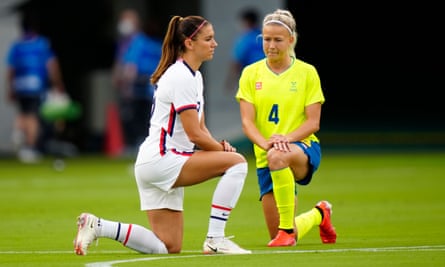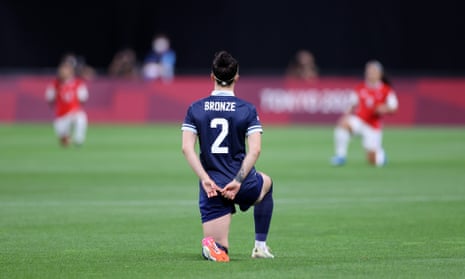The International Olympic Committee and Tokyo 2020 organisers have banned their social media teams from posting pictures of athletes taking the knee at these Olympic Games, the Guardian can reveal.
An insider said the message was delivered from on high on Tuesday evening Tokyo time, with a specific reference to Team GB’s women’s first football match against Chile, just hours before it kicked off in Sapporo on Wednesday.
The image of both teams taking the knee beforehand, in a protest against racism and online hate, was seen on live TV and the gesture was then followed by United States and Sweden players as well as those from New Zealand.
However none of these powerful pictures were posted on the official Tokyo 2020 live blog, or its Facebook and Twitter pages, or its Instagram site, which has more than half a million followers. They were also not seen on any of the IOC’s social channels.
An insider told the Guardian they found the IOC’s stance odd given the organisation celebrates iconic pictures of protest – including Tommie Smith and John Carlos raising their fists to protest against the unfair treatment of black people in the United States at the 1968 Olympics.
The decision also comes despite the IOC recently relaxing Rule 50, which had previously forbidden athletes to make any kind of “demonstration or political, religious or racial propaganda in any Olympic sites, venues or other areas”.
Peaceful protest is now allowed on the field of play, provided it is done without disruption and with respect for fellow competitors. However, sanctions are still threatened for any protests made on the medal podium.

Speaking after the match against Chile, Steph Houghton, one of Team GB’s three captains, said the decision to take a knee was supported by the entire squad. “As players in Great Britain we’ve been taking the knee in club and international matches and we felt strongly as a group that we wanted to show support for those affected by discrimination and equality,” she added.
“It was a proud moment because the Chile players took the knee too to show how united we are as sport.”
Team GB’s chef de mission, Mark England, said the squad had been “disgusted” by the racial abuse suffered by England players following their Euro 2020 loss to Italy.
“Certainly the women’s football team here feel very strongly about the online abuse and about the racism, Kick It Out campaign and about taking a knee, and we absolutely support them in that,” he added.
The IOC did not directly address the story when asked about it by the Guardian. However, a spokesperson said “the signal is distributed to all the broadcasters around the world with a huge TV audience”.
Meanwhile, speaking at a press conference on Wednesday, the IOC president, Thomas Bach, gave a curt response when asked about the women’s players taking a knee. “It is allowed,” he said. “It is no violation of Rule 50. That is expressively what is allowed in these guidelines.”
